
Refinancing With Payment Note – Is It The Right Choice For You?
You must be familiar with the concept of refinancing. Many have, although they remain bewildered about its meaning and the various ramifications it carries. To satisfy your insatiable appetite for knowledge, please read on. Mortgage refinancing is a topic that receives a lot of online attention.
Having the option to refinance your mortgage can provide financial breathing room during this uncertain economic time by reducing your monthly mortgage payment as well as saving you money over the life of the loan.
The Federal Reserve reports that the number of loan refinancing requests from Americans is 38% greater than it was a year ago, in part because the Fed lowered interest rates in response to the coronavirus pandemic, rendering borrowing more cheap for the average individual.
While there are many benefits to refinancing, the process can be difficult for borrowers with less-than-perfect credit or who aren’t familiar with the steps involved.
Refinancing means getting a new mortgage on your home for the same amount as the one you already have, or even more. Your new loan should have more favorable terms than your old one.
Your credit history and the amount of equity you have in your home are also considered.
While refinancing may appear to be a good idea at first glance, it might not wind up being the best option. It is essential to consider the benefits and drawbacks of each choice in light of your unique situation.
So here’s what you need to know before we get started:
Table of Content
- 1 Changing the loan’s duration by increasing or decreasing the interest rate
- 2 Benefiting from the current low interest rate
- 3 Switching to a credit card or loan with a fixed interest rate
- 4 Bringing down monthly mortgage costs
- 5 Taking advantage of the market and purchase a new residence
- 6 Getting funds necessary to carry out a home improvement project
- 7 Improving your economic situation
- 8 Conclusion
Changing the loan’s duration by increasing or decreasing the interest rate
If you’re having difficulties making ends meet every month, refinancing could help. Saving money and reducing your monthly payment is possible by extending the duration of your home loan term. If, for whatever reason, your monthly payment is too high, you could consider extending the length of your mortgage from 15 to 30 years.
On the other side, you’ll pay more in interest over the course of the loan’s lifetime if you opt for a longer repayment period. Refinancing to shorten your loan term could increase your payments each month, but in the long run, you’ll pay less interest and have more equity in your property.
Benefiting from the current low interest rate
Although interest rates are not as low as they were during the height of the pandemic, they are nonetheless historically low and expected to remain so for the foreseeable future. If you can refinance your mortgage and get a better interest rate, you should do it right away. Keep in mind that you may have to pay some out-of-pocket expenses, like as closing costs as well as other fees, even if you end up saving money overall.
Switching to a credit card or loan with a fixed interest rate
You, the homeowner with an adjustable-rate mortgage are probably aware that your loan’s interest rate might fluctuate and that a significant increase in that rate could increase your monthly payment. Shifting from a variable-rate mortgage to a low-interest-rate fixed-rate mortgage while the opportunity is still present is one way to avoid the risk of interest rate increases in the future.
Bringing down monthly mortgage costs
Given the cutthroat nature of the banking and insurance markets, you may expect to hear offers from a number of different banks and credit unions, both mainstream and otherwise, all vying for your business.
Refinancing your mortgage could be a good idea if doing so would result in a better interest rate, reduced fees, or a significantly better deal. As a result, you could be able to reduce your mortgage payment amount, perhaps by a significant amount.
If you refinance your mortgage, you may be eligible for benefits like offset accounts as well as redraw privileges that you didn’t have before.
Taking advantage of the market and purchase a new residence
By refinancing, you might potentially buy an investment property with a small or no down payment. That’s because it’s often possible to utilize the equity you’ve built up in your primary residence as security when applying for a loan to purchase an investment property.
Based on the preceding example, you would have $550,000 in home equity if the value of your assets was $1,000,000 and your mortgage was $350,000. Most mortgage companies will let you borrow up to 80% of your home’s worth without making you pay for private mortgage insurance if you have excellent credit.
If so, you are likely in a position to use $370,000 toward the down payment on another house.
With enough time and the right timing, you can use the equity you’ve accumulated in one home to buy another, potentially expanding your property portfolio.
Getting funds necessary to carry out a home improvement project
Renovations and additions to existing homes may be quite expensive and time-consuming projects. If you need money and don’t have any other options for getting it, refinancing could save you the most money.
It’s possible to get a construction loan, a private loan, or even use a credit card to put down some of the down payment on a home, however a home loan offers the best combination of low interest and flexibility. Therefore, by refinancing, you open the door to these advantages, which could lead to long-term cost savings.
Improving your economic situation
Finally, refinancing can be a useful tool for improving your financial situation, especially if you are saddled with debt or have multiple other personal obligations. Refinancing could let you consolidate all of your debts into one manageable amount, with the added benefit of having that debt be backed by your house.
You may be able to take advantage of reduced interest rates and simplify your financial situation by consolidating your debt into a single monthly payment. Keep in mind that this could force you to prolong your loan term, which would increase your interest payments.
Conclusion
Ultimately, the choice to refinansiering av gjeld med betalingsanmerkning is as much an individual one as the initial purchase of a home. There is help available, including a multitude of no-obligation resources that can help you explore your options, but ultimately, it is your call to make. A refinancing calculator can provide you a ballpark figure for your monthly payments and a good idea of the possible conditions of your new loan.
With this tool, you can determine if it makes financial sense to refinance your existing mortgage. It will ask for information such as the amount of your present mortgage, the current market worth of your home, how much money you bring in each month, and a few other details.


